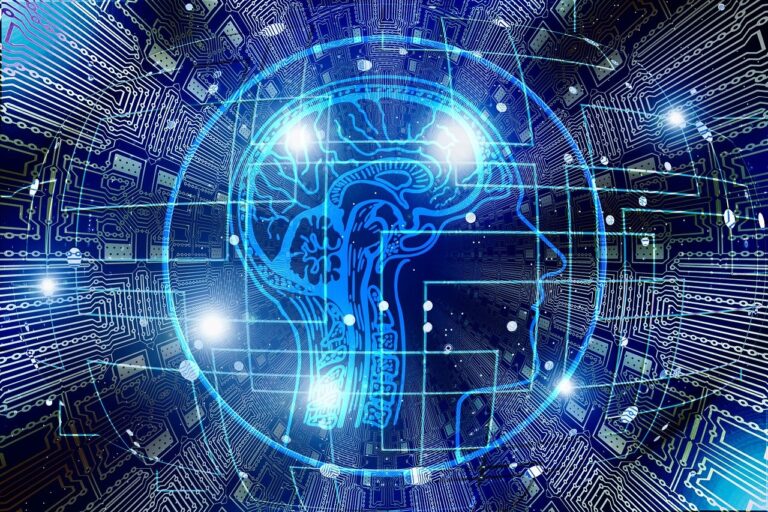Did you know that up to 80,000 hospital deaths each year are due to misdiagnosis? This shows how urgent it is for healthcare systems to innovate worldwide1. Artificial intelligence (AI) is changing medical care and technology. It’s making medicine more personalized and improving diagnosis accuracy2.
Healthcare faces big challenges like aging populations and high costs. But, AI is helping make care better and more efficient. Companies like Microsoft and Google are leading this change. They’re working on new AI tools that will soon help doctors a lot1.
Key Takeaways
- AI is crucial in addressing misdiagnosis issues, potentially reducing hospital deaths.
- The application of AI is uniquely tailored to meet the specific needs of healthcare systems.
- Innovations from tech leaders significantly enhance medical practice efficiency.
- AI-driven solutions improve diagnostics and patient care dramatically.
- Healthcare technology is evolving rapidly, promising smarter and faster systems.
Introduction to AI Revolutionizing Healthcare
Artificial intelligence is changing how we approach healthcare. It uses advanced learning and reasoning to mimic human thinking. AI is used in many ways, like diagnosing, planning treatments, and monitoring patients. This technology is greatly changing healthcare.
Definition and Scope
AI in healthcare combines technology and medicine. It has made a big impact in several areas:
- Diagnostics: Uses machine learning to read medical data.
- Treatment Planning: Makes personalized treatment plans based on patient data.
- Patient Monitoring: Uses AI for real-time health checks.
By 2030, the NHS might need nearly 250,000 more staff3. There will be 18 million fewer healthcare workers worldwide, including 5 million doctors3.
Historical Context
The journey of AI in revolutionizing healthcare started in the 1950s with big data breakthroughs. For over a decade, AI has been used in clinical settings, but its use is still limited4. Recently, AI has made huge strides in image and speech recognition3. The COVID-19 pandemic has also pushed AI into healthcare, solving big challenges.
AI in healthcare is not just about automating tasks. It aims to make diagnoses and treatments more accurate and less prone to errors. Companies like IBM, Apple, and Microsoft are investing in AI for healthcare4. As AI evolves, it will change how we care for patients.
The Impact of AI on Patient Care
AI is changing patient care in big ways. It focuses on personalized medicine, better diagnostics, and smarter treatment plans. This lets doctors tailor care to each patient’s unique needs.
Personalized Medicine
AI has made personalized medicine possible. It looks at each patient’s genes and lifestyle. This means treatments and tests are made just for them, making care more effective and safer.
AI helps doctors review patient data better. This leads to better health results for everyone5.
Improved Diagnosis Accuracy
AI makes diagnoses more accurate by looking at huge amounts of data. For example, in radiology, AI helps doctors by quickly spotting normal scans and speeding up abnormal ones5.
Tools like IBM’s Watson for Genomics use AI to find the best treatments for cancer. This means doctors can give more precise care6.
Enhanced Treatment Plans
AI helps make treatment plans better by giving doctors solid advice. It makes decisions faster and improves patient care. This leads to fewer problems and lower costs6.
Studies show AI can cut down on hospital stays and readmissions. This makes healthcare more efficient for everyone6.
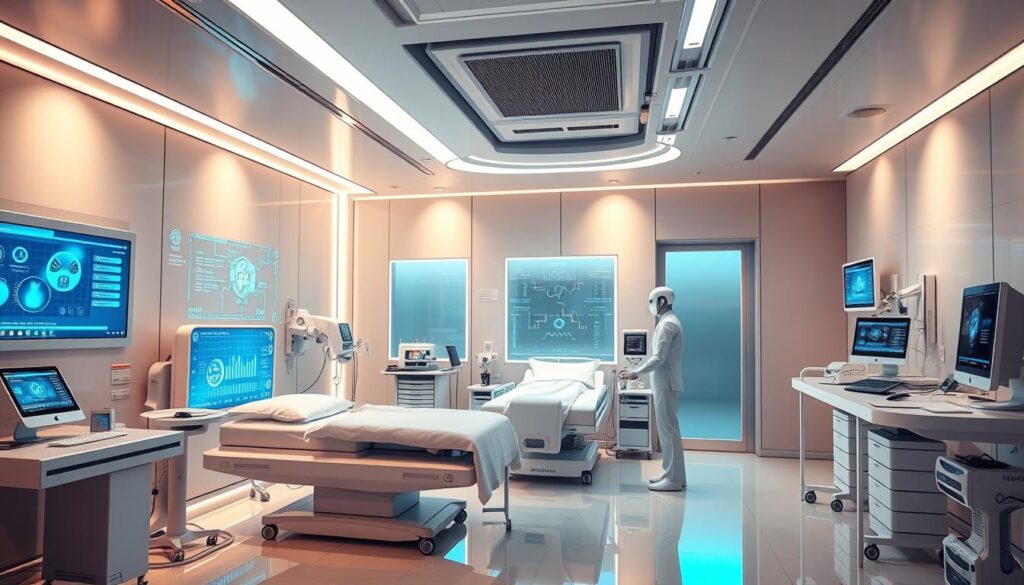
AI-Driven Diagnostics Tools
AI-driven diagnostic tools are changing healthcare a lot. They use machine learning to analyze images quickly. This makes doctors work faster and more accurately.
Hospitals do 3.6 billion imaging tests every year. But, only 3% of the data from these tests is used7. Using AI in medical imaging can help use more of this data. This leads to faster and better care for patients8.
Machine Learning in Imaging
Machine learning tools are changing how doctors diagnose. AI can look at X-rays and MRIs fast. It finds problems that humans might miss, making diagnoses more accurate9.
Over 400 FDA approvals for AI in radiology show healthcare’s trust in these tools7. Also, 48% of hospital leaders believe AI will help doctors make better decisions by 20287.
Predictive Analytics in Patient Outcomes
Predictive analytics are key to keeping patients safe. AI helps find problems early and sort risks. This improves care for patients9.
AI can make treatment plans that fit each patient’s needs. For example, it can predict kidney problems up to 48 hours before. This lets doctors take steps to prevent it, helping patients a lot9.
Research is ongoing to make AI diagnostics better. The goal is to make these tools common in healthcare. This will help improve care for everyone8.
Natural Language Processing in Healthcare
Natural language processing (NLP) is changing healthcare for the better. It makes it easier to manage clinical documents, turning raw data into useful information. This is crucial since most healthcare data is unstructured, making it hard to use10. The demand for NLP in healthcare is growing fast, with a yearly increase of 18%11.
Streamlining Clinical Documentation
NLP cuts down the time doctors spend on paperwork. It helps find and fix patient conditions that were missed or coded wrong10. Over half of healthcare workers use NLP to make their jobs easier10. These tools help doctors give better care by finding the right treatments faster10.
Enhancing Patient Communication
AI makes talking to patients better with tools like chatbots. They offer medical advice and help schedule appointments, making things more efficient10. NLP also analyzes patient feedback, helping doctors know what to improve on11. Companies like IBM and Microsoft are always working to make NLP better for healthcare11.
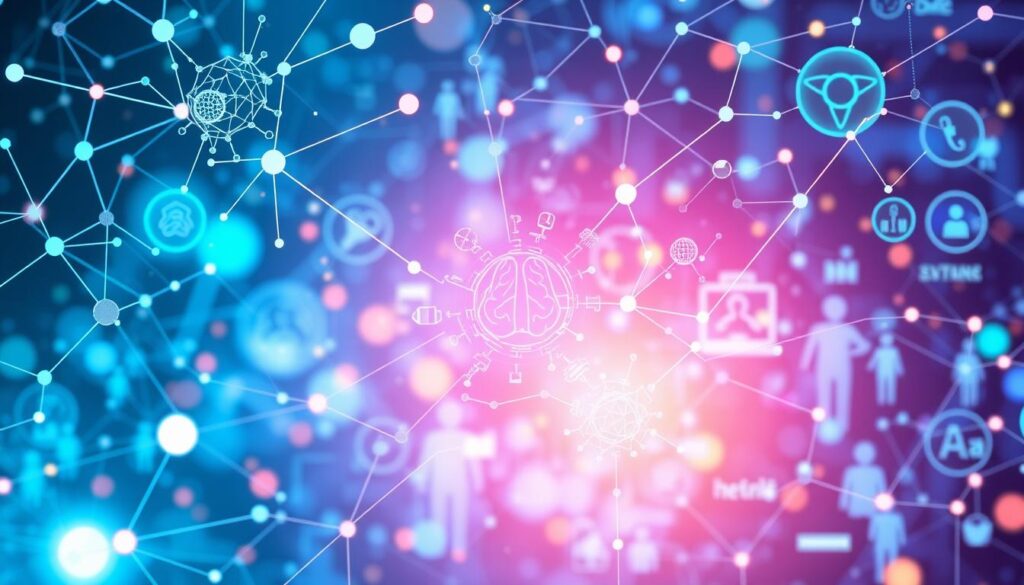
Robotic Surgery and AI
Robotic surgery is changing healthcare by using AI in surgeries. This technology helps surgeons do complex surgeries with better precision and less harm. It also means patients can recover faster and have fewer mistakes.
Benefits of Robotic-Assisted Procedures
Robotic-assisted surgeries show how well robotics and AI work together. They help teams use patient data to plan surgeries that fit each person’s needs. AI can even predict what will happen next in a surgery by looking at lots of footage12.
AI also makes surgeries safer. A study found that doctors using AI made fewer mistakes in finding cancer cells. Before, they made mistakes 3.4% of the time. With AI, it dropped to 0.5%12.
AI in Surgical Planning
AI makes planning surgeries easier by analyzing patient data and giving advice. It helps surgeons pick the best methods and saves time and resources. AI can also watch over important tissue during surgery, making it safer and more efficient13.
As AI grows in healthcare, so will the chance to make better surgical tools. This could make robotic surgery a key part of medical care in the future.
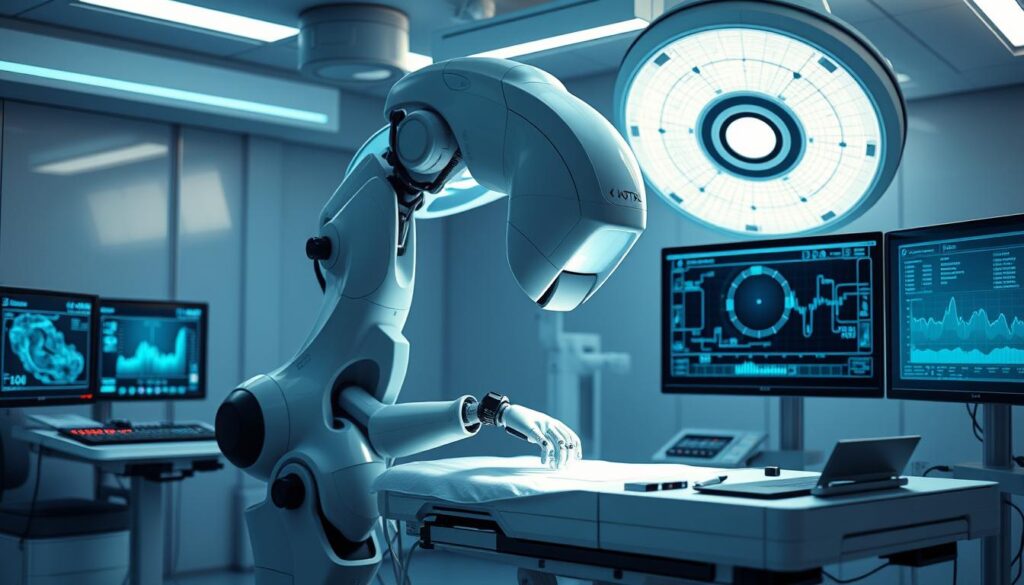
For more on AI in robotic surgery and its future, check out this link14.
AI in Drug Discovery
AI is changing how we find new medicines. It makes finding treatments faster and cheaper. This is key for solving big health problems quickly.
Accelerating Research and Development
AI has changed drug discovery a lot. It can guess protein structures for many proteins, making finding drug targets quicker15. Deep learning helps in many drug development stages. It looks through big data to find new treatments.
Companies using AI first have over 150 drugs in development. About 15 are in clinical trials15.
Reducing Time and Costs
AI is making drug development cheaper and faster. It can cut the number of control patients needed by half16. This saves money and speeds up trials.
Before, half of drug development money went to clinical trials. Recruitment took up a lot of time16. AI can predict when patients will drop out and make data easier to find. This is changing drug discovery a lot.
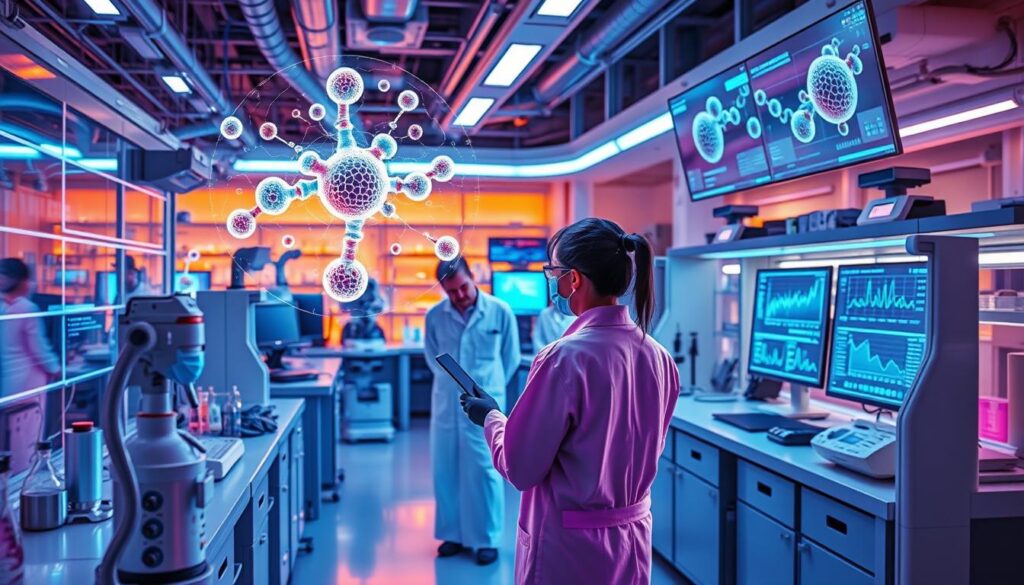
Integrating AI into Electronic Health Records
Artificial intelligence is changing how healthcare providers handle patient data. It makes managing and analyzing patient information more efficient and accurate. Many countries, including the United States, are spending billions to support AI in healthcare. This shows how important AI is for improving healthcare17.
Data Management and Analysis
AI helps organize and find patient data in EHR systems. It helps doctors get quick insights into patient histories and treatment plans. Yet, most organizations struggle to use AI fully, showing the need for better tools18.
AI is being used in many healthcare areas, like diagnosing and creating treatment plans. This improves how doctors make decisions17.
Improving Patient Privacy and Security
Keeping patient information safe is crucial with AI in EHR systems. Efforts to improve cybersecurity are key to keeping trust in these technologies. Epic Systems is working on an “AI Trust and Assurance Suite” to monitor AI models18.
This aims to give healthcare organizations the tools to protect sensitive health data. It helps prevent breaches and misuse.
The Role of Wearable Technology
Wearable technology has changed healthcare a lot. It lets you keep an eye on your health all the time. These smart devices give you real-time data to spot health problems early.
Continuous Health Monitoring
Chronic diseases like diabetes and heart disease are common. So, we need ways to track health all the time. Wearable sensors track heart rate, blood pressure, and sleep patterns. They give doctors important data19.
This means patients can get alerts about their health. They can take care of themselves sooner. The wearable health tech market is expected to grow a lot. It will go from $10.4 billion in 2021 to $120.2 billion by 202820.
AI in Remote Patient Management
AI helps a lot in remote healthcare. It uses machine learning to track health and predict risks19. For example, AI can spot diabetes and heart disease early. It helps make care plans that work better for each patient20.
Even though there are issues like data privacy and sensor accuracy, AI makes wearable tech better. It ensures the data is reliable and useful.

Ethical Considerations in Medical AI
The use of artificial intelligence in healthcare raises big ethical questions. Keeping patient data safe is key, as technology makes it harder to protect this information. It’s crucial to keep trust between patients and doctors as AI grows. Also, ethical principles must guide AI to improve care and avoid unfair outcomes.
Data Privacy Concerns
Medical AI brings up big concerns about data privacy. As AI gets more common in healthcare, keeping patient data safe is more important than ever. The European Parliament has pointed out the need for clear rules and openness in AI use21. Hospitals must have strong policies to protect data and improve their tech.
Bias in AI Algorithms
Algorithmic bias in AI is another big issue. This bias can make health problems worse by leading to bad decisions, especially for some groups. Studies show that not enough diversity in AI training data is a big part of the problem22.
It’s important to make sure AI is fair for everyone. We need to keep checking and improving AI to make sure it treats all patients right. Being open about how AI works is key to building trust and avoiding unfair outcomes.
The Future of AI in Healthcare
The world of healthcare is changing fast, thanks to AI. We’re seeing new ways to care for patients and improve treatments. Experts say we’ll see better predictions and more tailored medicine, leading to better health for everyone.
Potential Innovations on the Horizon
AI has the power to change healthcare a lot. It can help patients and doctors, making care cheaper and better for everyone23. AI is already helping with important medical images, making doctors’ jobs easier24.
It can also quickly analyze medical data, like kidney issues, saving a lot of time23. AI is making it easier to manage long-term illnesses by connecting people with the right care and reminders.
Challenges to Overcome
But, there are still big challenges for AI in healthcare. Making sure AI is safe and works well is key. The World Health Organization wants strict rules for AI in health24.
AI can also have biases, which could unfairly affect care23. Working together, like the Health AI Partnership, is crucial to solve these problems and make AI safe and fair for everyone23.
Case Studies: Successful AI Implementations
Healthcare institutions are using AI to change patient care and make things more efficient. By looking at AI case studies, you can see how AI is changing medical practices.
Notable Hospitals and Institutions
Top hospitals are using AI to tackle big healthcare problems. Programs like “AI in Health Care: From Strategies to Implementation” teach how to use AI with real data. This helps professionals make these changes work25.
Measurable Outcomes and Benefits
AI in hospitals has brought big results. For example, AI finds patterns and problems better than people, cutting down on wrong diagnoses, especially in strokes26. The benefits include:
- AI cuts down errors in medical images from 3.6% to under 3%.
- Virtual nurses help patients, with 75% preferring them over real nurses.
- AI makes admin tasks easier, so doctors can focus on patients.
Telemedicine has made healthcare more accessible in hard-to-reach areas. AI helps with virtual visits and managing chronic diseases26. Learn more about successful AI applications and their results at this link.
Conclusion: Embracing AI in Healthcare
As healthcare changes, using AI is key to better care and solving big problems. It’s vital to adapt and use AI’s power. AI helps doctors make accurate diagnoses and find the right treatments. This leads to better health outcomes and makes healthcare more efficient27.
The Importance of Adaptation
You work in a field that can greatly improve patient care. Studies show AI can boost patient results by up to 45% for diseases like diabetes and heart disease28. AI makes healthcare work better, making it more efficient and smooth for everyone.
Looking Ahead in Medical Technology
The future of healthcare looks bright with AI. AI will make healthcare better and more accessible. Tools like those from Eko Health can spot heart problems early, cutting down on missed diagnoses by up to 30%28. By embracing AI, you help make healthcare better and more caring, promising a bright future.
Learn more about AI’s impact on and its role in shaping the future of medical technology.
FAQ
What is the role of AI in healthcare?
How does AI enhance diagnostic accuracy?
What are the benefits of robotic surgery?
How does natural language processing (NLP) improve healthcare?
What impact does AI have on drug discovery?
What are the ethical considerations surrounding AI in healthcare?
How do wearable technologies contribute to patient monitoring?
What is the future of AI in healthcare?
Source Links
- Council Post: How AI Is Transforming Healthcare – https://www.forbes.com/councils/forbestechcouncil/2020/03/16/how-ai-is-transforming-healthcare/
- Revolutionizing Healthcare: How is AI being Used in the Healthcare Industry? – https://www.lapu.edu/ai-health-care-industry/
- Artificial intelligence in healthcare: transforming the practice of medicine – https://pmc.ncbi.nlm.nih.gov/articles/PMC8285156/
- Artificial Intelligence (AI) in Healthcare & Medical Field – https://www.foreseemed.com/artificial-intelligence-in-healthcare
- Impact of Artificial Intelligence (AI) Technology in Healthcare Sector: A Critical Evaluation of Both Sides of the Coin – https://pmc.ncbi.nlm.nih.gov/articles/PMC10804900/
- How Artificial Intelligence is Impacting the Health Care Field – https://onlinedegrees.sandiego.edu/ai-healthcare/
- How AI Is Improving Diagnostics, Decision-Making and Care | AHA – https://www.aha.org/aha-center-health-innovation-market-scan/2023-05-09-how-ai-improving-diagnostics-decision-making-and-care
- Revolutionizing Patient Care with AI-Driven Diagnostics | Thoughtful – https://www.thoughtful.ai/blog/revolutionizing-patient-care-with-ai-driven-diagnostics
- Artificial intelligence in diagnosing medical conditions and impact on healthcare – https://www.mgma.com/articles/artificial-intelligence-in-diagnosing-medical-conditions-and-impact-on-healthcare
- Natural Language Processing in Healthcare Medical Records – https://www.foreseemed.com/natural-language-processing-in-healthcare
- Leveraging Natural Language Processing (NLP) in Healthcare – https://intellias.com/natural-language-processing-nlp-in-healthcare/
- AI Is Poised to “Revolutionize” Surgery – https://www.facs.org/for-medical-professionals/news-publications/news-and-articles/bulletin/2023/june-2023-volume-108-issue-6/ai-is-poised-to-revolutionize-surgery/
- How AI is Advancing Technology in Surgery and Intervention – https://blog.engineering.vanderbilt.edu/2-examples-of-how-ai-is-advancing-technology-in-surgery-and-intervention
- Artificial Intelligence With Robotics in Healthcare: A Narrative Review of Its Viability in India – https://pmc.ncbi.nlm.nih.gov/articles/PMC10287569/
- How Artificial Intelligence is Revolutionizing Drug Discovery – Bill of Health – https://blog.petrieflom.law.harvard.edu/2023/03/20/how-artificial-intelligence-is-revolutionizing-drug-discovery/
- How AI is being used to accelerate clinical trials – https://www.nature.com/articles/d41586-024-00753-x
- The role of artificial intelligence for the application of integrating electronic health records and patient-generated data in clinical decision support – https://www.ncbi.nlm.nih.gov/pmc/articles/PMC11141850/
- The Promise of AI in Electronic Health Records is Here – https://guidehouse.com/insights/healthcare/2024/ai-in-ehrs-is-here
- The Emergence of AI-Based Wearable Sensors for Digital Health Technology: A Review – https://pmc.ncbi.nlm.nih.gov/articles/PMC10708748/
- The Emergence of AI-Based Wearable Technology in Healthcare – https://www.ideas2it.com/blogs/how-ai-can-improve-healthcare-and-medicine
- Frontiers | Legal and Ethical Consideration in Artificial Intelligence in Healthcare: Who Takes Responsibility? – https://www.frontiersin.org/journals/surgery/articles/10.3389/fsurg.2022.862322/full
- Health Equity and Ethical Considerations in Using Artificial Intelligence in Public Health and Medicine – https://www.cdc.gov/pcd/issues/2024/24_0245.htm
- AI in healthcare: The future of patient care and health management – Mayo Clinic Press – https://mcpress.mayoclinic.org/healthy-aging/ai-in-healthcare-the-future-of-patient-care-and-health-management/
- The future of AI in healthcare – https://www.iqvia.com/blogs/2024/02/the-future-of-ai-in-healthcare
- AI in Health Care: From Strategies to Implementation Program | Harvard Medical School – https://execonline.hms.harvard.edu/artificial-intelligence-in-health-care-from-strategies-to-implementation
- Top 5 Cases for Using AI in the Healthcare Industry – Glorium Technologies – https://gloriumtech.com/top-5-use-cases-for-ai-in-healthcare/
- AI and Healthcare: Transforming Health Care with Artificial Intelligence – https://clients.stepup.one/blog/ai-and-healthcare
- Revolutionizing Healthcare: The Transformative Power of AI – https://www.aapa.org/news-central/2024/05/revolutionizing-healthcare-the-transformative-power-of-ai/



